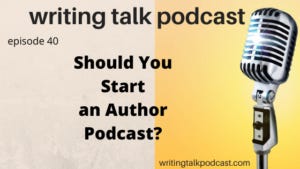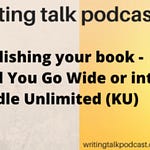Getting started with podcasting as an author
Here’s the full podcast
Episode Notes
The main resource you’ll need is time – figure on two or three hours (or more) to put each episode together – be realistic!
Will your podcast be aimed at readers or other writers – decide this early.
Does your idea have legs? Can you jot down 20 ideas for episodes? How easy is it to come up with ideas for future shows?
What’s the value that you’ll be bringing to your audience?
What’s the rationale for your show? Will it have a theme or an objective that will tie all the episodes together?
How will you benefit from the time that you invest in the show?
Will you have a co-host to share ideas with?
Will you have informative guests?
How good are you at reaching out to people? You will need this skill if you want guests.
Podcasting Equipment for Beginners
Links below are affiliate links so using them will support the podcast – they don’t cost you anything, but amazon rewards me for each sale.
You will need a microphone, and most people start with a USB microphone – I’m not an expert on this but I have tried a few. I settled for a cardioid condenser microphone and this works well for me – I live in a quiet area and I have a home office that makes a decent place to record. Your choice will depend on several factors so I suggest you do some research – see below.
Entry-level microphone for podcasters:
Blue Snowball: https://amzn.to/2YDiiN0
A better USB microphone for podcasters:
Blue Yeti: https://amzn.to/2VoUwm8
I haven’t tried this one, but it’s worth checking it out – the Neat Beecaster professional microphone: https://amzn.to/3g0Flaq
In the UK try this microphone for podcasting
For quite a while, I used the Auna 900 USB and I like it a lot: https://amzn.to/3eHUtcv
An excellent microphone setup for podcasters:
NEAT King Bee Cardioid Solid State Condenser Microphone with Pop Filter and Shockmount- this is my latest and was used for this podcast
You’ll also need a USB audio interface. I use the Focusrite Scarlett Solo 3rd gen
And to complete this microphone setup, you’ll need a couple of extra items – an XLR cable
and a stand such as the Samson MK10 which I find to be sturdy and reliable
Software for Podcasters
You will need audio recording and editing software (often referred to as a DAW – a digital audio workstation).
Free: Audacity https://www.audacityteam.org/
Mid-price: Reaper http://reaper.fm/
Premium: Adobe Audition https://www.adobe.com/products/audition.html
Headphones are optional but will be useful. Pick a comfortable pair of over-ear headphones that enclose your ear so that sound doesn’t leak out to your microphone.
Podcast hosting
You will be investing time and energy into your show, so invest in proper hosting.
Plans vary widely – for a recommended podcast host and discount coupon, see below:
I use and recommend Pinecast.
Please use this coupon code to get 40% off for 4 months:
r-9929b4
You save money and I get a small reward if you use this coupon code. Here’s the link: https://pinecast.com/
Writers’ toolbox
Podcastage on youtube
Booth Junkie:
The Audacity to Podcast podcast is an excellent source of info: theaudacitytopodcast.com
If using Reaper, there are a lot of tutorials online:
I hope you enjoyed this episode. If you did, please share it with your friends. You can also support the show by subscribing and leave a review and a rating:
Your ratings and reviews will enable the podcast to continue and to improve – thank you.













Share this post